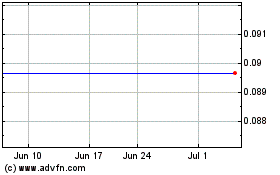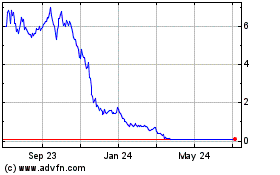By Eliot Brown
It took Google eight years to reach $10 billion in sales, the
fastest ever for a U.S. startup. In the current SPAC frenzy, a
spate of electric-vehicle companies planning listings are vowing to
beat its record -- in some cases by several years.
Among the most ambitious are luxury-car maker Faraday Future,
U.K.-based electric-van and bus maker Arrival Group, and auto maker
Fisker Inc. Each has disclosed plans to surpass the $10 billion
revenue mark within three years of launching sales and
production.
Alphabet Inc.'s Google was followed by Uber Technologies Inc.,
which hit that mark within nine years of its first revenue, and
then by Facebook Inc. and auto maker Tesla Inc., which surpassed
$10 billion in revenue within 11 years of first generating sales,
according to a Wall Street Journal analysis of data provided by
research firm Morningstar Inc.
Two other companies, Israel-based electric-vehicle component
supplier Ree Automotive Ltd. and Archer Aviation Inc., which
intends to make an electric helicopter-like vehicle, plan to hit
the mark within seven years of launching their products. Those two
-- like Faraday, Arrival and Fisker -- have completed listings or
are in the process of going public by merging with special-purpose
acquisition companies, or SPACs.
The forecasts for record-setting growth illustrate the extent of
the fervor for electric-vehicle startups, particularly for those
going public by merging with SPACs, which are shell firms that list
on a stock exchange with the sole purpose of acquiring a private
company to take it public. More than 10 electric-vehicle or battery
companies that struck deals with SPACs have been valued in the
billions of dollars before producing any revenue, as amateur
traders and many traditional investors have flocked to the buzzy
sector.
Backers say a shift away from gas-powered cars should open doors
for new brands. Much of the enthusiasm, investors say, is also
because of the glow from electric-vehicle maker Tesla's $665
billion market capitalization. While its stock has fallen in recent
months, Tesla shares soared more than eightfold in 2020.
Startups hoping to replicate Tesla's success have been choosing
SPACs -- a speedier alternative to a traditional initial public
offering, with looser regulatory requirements -- and releasing
charts to investors showing how their plans call for them to grow
faster than Tesla did. Those projections, which regulations
strongly discourage in IPOs, are another important factor in how
investors value the emerging companies. Expectations of growth tend
to lead to higher valuations.
The extraordinary aspirations and the lofty valuations have
caused some analysts to say the forecasts are unrealistic.
Pavel Molchanov, an analyst at Raymond James who covers the
clean-tech sector, said all of these projections need a
"haircut."
Even with governments around the globe pushing consumers away
from gasoliine-powered cars, there is set to be a wave of new
electric cars that could overwhelm consumers, Mr. Molchanov said.
"I think there is too much optimism about demand," he said.
The companies and their backers say they face a far different
market than the fastest-growing companies of yesteryear. Even the
best tech companies can take a while to become household names, but
cars and trucks have such high price tags that it takes relatively
few buyers to reach sales figures in the billions, they say.
Further, they say, the electric-vehicle market has matured
significantly since Tesla was beginning, opening up the startups --
many of which have raised sizable chunks of funding early in their
lives -- to a wealth of suppliers that can make production
easier.
Simon Sproule, a spokesman for Los Angeles-based Fisker, said
the company's plan to rely on third-party manufacturers to build
its cars will allow it to increase manufacturing far faster than
Tesla did, while its initial vehicle is aimed more at the mass
market.
"The addressable market we're going into is much, much bigger"
than Tesla's, he said.
Arrival, which plans to go from no revenue this year to $14
billion in 2024 by selling electric buses and delivery vans, is
betting that operators of large fleets of the vehicles will quickly
transition to electric amid broader government efforts to reduce
emissions.
"We believe this is an inflection point for rapid adoption of
millions of electric vehicles," said Avinash Rugoobur, Arrival's
president.
Others with forecasts for rapid growth include Joby Aviation,
which estimates it will have $20 billion in revenue in about 10
years, and electric-car maker Lucid Motors Inc., which plans to
reach $22 billion in sales by 2026. Lucid has already generated
some revenue from battery sales and is launching its first car this
year.
Before the companies deal with demand, some investors say a
stumbling block could come from manufacturing, a particularly
challenging endeavor given the complex auto supply chain.
Gavin Baker, a large investor in Tesla in the early 2010s when
he was portfolio manager at mutual-fund company Fidelity
Investments, said it is unlikely the companies "are going to be
able to ramp at a rate two-to-three times faster than Tesla did"
after it launched its Model S.
"It is easy to make PowerPoint slides; it's relatively easy to
make a few prototypes that look good and drive well," said Mr.
Baker, now the chief investment officer at Atreides Management LP.
"It's mass producing high-quality, reliable cars that's hard."
Startups that publicly list through SPACs face different
regulations around forecasts than IPOs because the deals are
officially mergers, not public offerings that face a higher level
of scrutiny from regulators.
This dichotomy has raised concerns among some venture
capitalists and others who say the inherently speculative forecasts
can contribute to hype around a company that it wouldn't receive in
an IPO.
"The real problem here is it's a regulatory arbitrage -- it's a
loophole, " said Robert Jackson, a former commissioner with the
U.S. Securities and Exchange Commission and a professor at New York
University's law school. He said regulators should make it more
difficult for companies to publicly offer such projections.
Some SPAC managers have hailed the ability to provide
projections, saying they help startups communicate their vision to
investors.
Regulators are paying attention. Officials from the SEC last
week indicated they are stepping up scrutiny of the SPAC
market.
Write to Eliot Brown at eliot.brown@wsj.com
(END) Dow Jones Newswires
March 15, 2021 05:44 ET (09:44 GMT)
Copyright (c) 2021 Dow Jones & Company, Inc.
Fisker (NYSE:FSR)
Historical Stock Chart
From Mar 2024 to Apr 2024

Fisker (NYSE:FSR)
Historical Stock Chart
From Apr 2023 to Apr 2024
